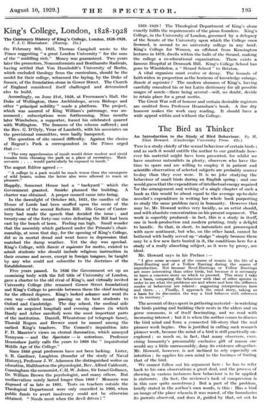King's College, London, 1828-1928
The Centenary History of King's College, London, 1828-1928. F. J. C. Hearnshaw. (Harrap. 21s.) ON February 9th, 1825, Thomas Campbell wrote to the Times suggesting "a great London University" for the sons of the "middling rich." Money was guaranteed. Two years later the promoters, Nonconformists and Benthamite Radicals, having settled that Von Humboldt's University of Berlin, which excluded theology from the curriculum, should be the model for their college, witnessed the laying, by the Duke of Sussex, of the foundation-stone in Gower Street. The Church of England considered itself challenged and determined also to build.
Accordingly, on June 21st, 1828, at Freemason's Hall, the Duke of Wellington, three Archbishops, seven Bishops and other "principal nobility" made a platform. The project, which was assured of King William's patronage, was an- flounced; subscriptions were forthcoming. Nine months later Winchelsea, a supporter, forced his celebrated quarrel with Wellington. The finances of the scheme suffered ; and the Rev. G. D'Oyly, Vicar of Lambeth, with his associates on the provisional committee, were badly hampered.
The question of site caused difficulty. Against the choice of Regent's Park a correspondent in the Times urged that :— " The very apprehension of insult would deter modest and timid females from choosing the park as a place of recreation. Maid- servants . . . . would particularly be exposed to insult."
The august Editor agreed :— " A college in a park would be much worse than the menagerie of wild beasts, unless the latter also were allowed to roam at pleasure."
Happily, Somerset House had a "backyard" which the Government granted. Smirke planned the building. A charter was obtained. A proper council came into being.
In the dawnlight of October 8th, 1831, the candles of the House of Lords had been snuffed upon the scene of the extinction of the second Reform Bill. His Grace of Canter- bury had made the speech that decided the issue ; and twenty-one of the forty-one votes defeating the Bill had been cast by the bench of lawn. Feeling ran high. Small wonder that the assembly which gathered under the Primate's chair- manship, at noon that day, for the opening of King's College, did so in mortal dread and went home in depression that matched the damp weather. Yet the day was epochal. King's College, with Sancte et sapienter for motto, existed to admit students who should include religious instruction in their courses and never, except in foreign tongues, he taught by any who could not subscribe to the doctrines of the Establishment.
Five years passed. In 1836 the Government set up an examining body with the full title of University of London, gave a charter to the old rival of King's, and virtually invited University College (the renamed Gower Street foundation) and King's College to providebetween them the chief teaching for the offered degrees. King's looked askance and went its own way—which meant passing on its best students to Oxford and Cambridge. The day school, the medical side (with an Requited hospital) and evening classes (in which Hardy and Arber enrolled) were the most important parts of the institution. Daniell, Wheatstone (of telegraph fame), Thorold Rogers and Brewer must be named among the earliest King's teachers. The Council's inquisition into F. D. Maurice's views on eternal damnation, which annoyed Tennyson — and the Spectator — is notorious. Professor Hearnshaw justly calls the years to 1868 the " inquisitorial Middle Age of the College."
Since 1868 great professors have not been lacking. Lister, S. R. Gardiner, Laughton (founder of the study of Naval History), Professor J. W. Adamson the distinguished writer on education, Halliburton the physiologist, Rev. Alfred Caldecott, Cunningham the economist, C. H. W. Johns, Sir Israel Gollancz, Dr. William Brown the psychologist, and many others. But mediaevalism surely lasted longer than 1868? Momerie was disposed of as late as 1891. Tests on teachers outside the Theological Department were only cancelled in 1903, when public funds to avert insolvency could not be otherwise Obtained. "Needs must when the devil drives 1 '! 1831-1929' The Theological Department of King's alone exactly fulfils the requirements of the pious founders. King's College, in the University of London, governed by a delegacy of the Senate of the University upon which the College once frowned, is second to no university college in any land. King's College for Women, an offshoot from Kensington lectures in 1879, dwells within the halls of the Strand, making the college a co-educational organization. There exists a famous Hospital at Denmark Hill. King's College School has gone to Wimbledon, a "Strand School" to Brixton.
A vital organism must evolve or decay. The bounds of faith widen in proportion as the horizons of knowledge enlarge. Sanete et sapienter ? The modern alumnus of King's, having carefully consulted his or her Latin dictionary for all possible usages of sancte—there being several—will, no doubt, decide to retain place for a great motto.
The Great War roll of honour and certain desirable registers are omitted from Professor Hearnshaw's book. A fine dry humour makes the work easy reading. It should have a wide appeal within and without the College.
































 Previous page
Previous page